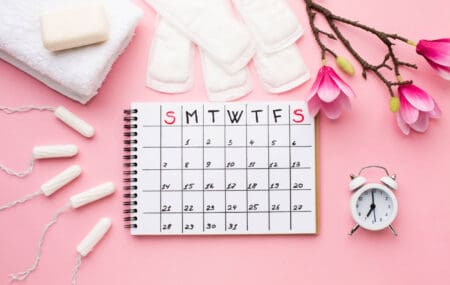
Menstrual Hygiene & Vaginal Health: A Guide to Staying Fresh and Healthy
For some Muslim women, periods aren’t the most comfortable time of the month. But know this: managing your menstrual hygiene appropriately can make a world of difference to how you feel and your overall health.
Menstrual hygiene goes beyond staying clean — it’s about maintaining a balanced environment that protects your vaginal health. This way you can stay fresh and comfortable throughout your cycle. In this guide, we’ll explore essential tips and practices to help you master menstrual hygiene while caring for your body with confidence and comfort.
What is menstrual hygiene?
Menstrual hygiene refers to practices that ensure cleanliness, comfort, and protection during menstruation in a safe and convenient way. It broadly involves regular private access to and changing of menstrual products, proper disposal of used items, and maintaining clean and dry intimate areas to reduce the risk of irritation or infections. Good menstrual hygiene helps prevent odour, discomfort, and health issues, ensuring that your period doesn’t interfere with your daily life or well-being.
Vaginal health focuses on maintaining the natural balance of the vaginal environment. The vagina is an organ in your body that contains yeasts and bacteria that work together to keep it healthy. These bacteria create an acidic environment, which helps protect against infections. However, certain factors or events can disrupt this balance, affecting how the vaginal system functions and potentially leading to discomfort or health issues. Maintaining this balance is key to overall vaginal well-being.
Islam and cleanliness
Islam places great emphasis on cleanliness — whether it’s of the body, mind, or soul. This applies during menstruation. In fact, the Prophet Muhammad ﷺ encouraged acts of personal hygiene like brushing teeth, trimming nails, and washing regularly. Not only does good grooming and hygiene ready us for worship, but it also helps prevent illness and improve our overall health and well-being. So, it’s always a good idea to be mindful of our hygiene practices, and know that this is an important aspect of maintaining spiritual purity as well.
Menstrual products: Choosing what works for you
Whether you’re using pads, tampons, menstrual cups or period underwear, the key is to choose what’s right for your body and lifestyle. Each product has its pros and cons, but hygiene is a priority.
Here’s the breakdown of the main options:
- Pads: These are the most commonly used menstrual products. They are placed on the underwear, and come in a variety of sizes and absorbency levels. Change them every 4-6 hours to prevent bacterial buildup and odour. Also look for unscented pads to avoid irritation.
- Tampons: Tampons are inserted into the vagina to absorb blood before it exits the body. They are discrete and convenient for active lifestyles. However, tampons must be changed every 4-8 hours to avoid the risk of toxic shock syndrome (TSS); a rare but serious bacterial infection.
- Menstrual Cups: Menstrual cups have gained popularity due to their eco-friendliness and convenience. Made from medical-grade silicone, they can be worn for up to 12 hours, depending on your flow. But, they still need to be emptied and cleaned regularly according to the manufacturer’s instructions. For many women, they offer comfort and reliability with less environmental waste.
- Period Underwear: Absorbent and reusable, period underwear is designed to be worn alone or as backup with other products. They’re a comfortable and eco-friendly option. You should aim to change them every 8-12 hours and wash after each wear.
- Menstrual Discs: Similar to cups, these sit higher in the vaginal canal, near the cervix. They can also be worn for up to 12 hours, and are disposable or reusable depending on the brand. Discs are a great alternative for women looking for both flexibility and discretion.
How often should you change your menstrual products?
You can read more about this here. But in short, changing your products frequently is essential for both comfort and health. Pads and tampons should be changed every 4-6 hours. Menstrual cups can last up to 12 hours, but should still be emptied and washed regularly. If you’re using reusable products like cups or period underwear, always follow the cleaning instructions to prevent infections.
Remember, neglecting to change your products can lead to bacterial infections, discomfort, and unpleasant odours.
Cleaning and maintaining vaginal health
The vagina is self-cleaning. But a little extra care is an important part of overall well-being . Here’s how to keep things fresh without overdoing it:
- Washing hands: Always wash your hands before and after changing any menstrual product. This simple habit can help prevent the transfer of bacteria to your vagina, and reduce the risk of infections.
- Gentle cleaning: Avoid using harsh soaps or scented products at all costs. These can disrupt your vagina’s natural pH balance, and lead to issues such as bacterial vaginosis or yeast infections. Stick to warm water, and if necessary, a mild, unscented soap to clean the vulva (the external part).
- Wash externally only (the vulva): The inside of the vagina doesn’t need cleaning. Using douches, and inserting any products into the vaginal canal is unnecessary and can cause more harm than good by disturbing your body’s natural balance.
- Daily showers: Showering daily helps keep you feeling fresh. I know this can feel really difficult, especially if you are struggling mentally. If you can’t shower everyday, make sure to at least wash your vagina. If you use unscented wipes, ensure they are free from chemicals that could irritate the delicate skin around the vulva.
- Avoiding scented products: Scented pads, tampons, or vaginal washes can disrupt the vagina’s natural pH balance and lead to infections. Always choose unscented, chemical-free products.
- Breathable fabrics: Avoid tight clothing like synthetic underwear. These can trap heat and moisture, creating an environment where bacteria or yeast thrive. Instead, opt for loose, breathable fabrics such as cotton. Cotton allows air circulation, helping to keep the vaginal area dry and reducing the risk of infections.
Dealing with discomfort and odour
It’s normal to feel a little uncomfortable during your period, but there are ways to manage it effectively:
- Stay dry: One common cause of odour during menstruation is dampness. Wearing cotton underwear and loose-fitting clothes can help your skin breathe and keep the area dry. If you’re using pads, opt for breathable, cotton-based ones to maintain freshness.
- Change regularly: As mentioned earlier, changing your menstrual products frequently helps reduce the risk of bacteria growing and odour.
- Stay hydrated: Drinking plenty of water is important for vaginal health. It helps keep your vaginal tissues lubricated and moist, which reduces the risk of irritation and infection. It also washes out bacteria before infections can flare up.
- Eat mindfully: Avoid foods that are high in salt or caffeine, as they can make you feel more bloated and uncomfortable. Instead, opt for nutrient-rich foods like leafy greens, which are high in iron and can help replenish what your body loses during menstruation.
When to seek medical advice
Vaginal discharge changes throughout your menstrual cycle, and this is completely normal! It’s a sign that your reproductive system is working correctly. You can learn more about different variations of discharge and what they mean here.
However, if you notice sudden changes ike a foul smell, unusual colour (green or grey), or an unusually thick consistency, this could be a sign of an infection. Here are a few signs that may indicate something more serious:
- Discharge that’s unusually thick or thin
- A sudden increase in volume
- Discharge that’s grey, green, or an odd shade of yellow or brown
- Pain, itching, or swelling around the vulva
- An unpleasant, fishy, or metallic smell
These symptoms could point to infections like bacterial vaginosis, yeast infections, or STIs — all of which require treatment. When in doubt, it’s always best to consult with a healthcare professional.
Final thoughts: your health, your comfort
Menstrual hygiene isn’t just about feeling clean — it’s about protecting your vaginal health and ensuring your comfort during your period. By choosing the right products, practising proper hygiene, and paying attention to your body, you can make your period a smoother, more manageable experience.
We can also understand that it’s easy to feel embarrassed about discussing your discharge or other intimate health concerns. But remember — your health matters! If something feels off, don’t shy away from seeking help. Taking charge of your health is one of the most powerful things you can do. That starts with knowledge — don’t be afraid to stay informed and ask questions! You’re balancing physical health with spiritual and emotional well-being, as well as honouring the body Allah has blessed you with!

